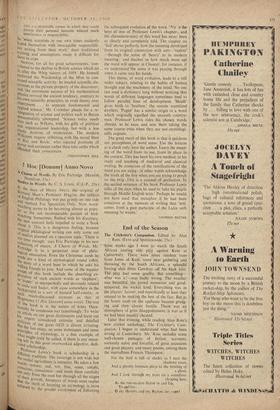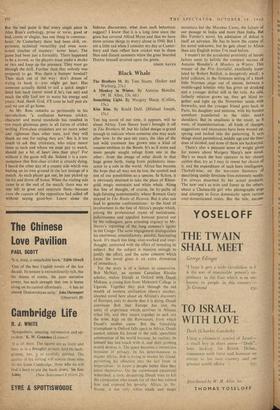End of the Season
The Cricketer's Companion. Edited by Alan Ross. (Eyre and Spottiswoode, 25s.) SOME weeks ago I went to watch the South African touring side play against Kent at Canterbury. There were some insolent 'runs from Jones of Kent, some neat gathering and throwing by the South Africans, a splendid forcing shot from Cowdrey off his back foot. The play had some quality. But something— what was it? --was badly wrong. The weather was beautiful, the crowd numerous and good- tempered, the wicket kind: Everything was in the players' favour, and superficially at least they seemed to be making the best of the fact. But as the hours went on the applause became grudg- ing and then almost hostile. There was an atmosphere of grim disappointment; it was as if we had been meanly cheated.
Later that evening, while reading Alan Rdss's ' new cricket anthology, The Cricketer's Com- panion, I began to understand what had been wrong at Canterbury. Mr.' Ross includes some well-chosen passages of fiction; accounts, variously naive and forceful, of great occasions and great players; and many poems, among them the marvellous Francis Thompson :
For the field is full of shades as 1 near the shadowy coast,,
And a ghostly batsman plays to the bowling of a ghost. And I look through my tears on a soundless- clapping host. As the run-stealers flicker to and fin,
To and fro:
: 0 my .Hornby and m■ Barlow !or.' ago!
But the real point is that every single piece in Alan Ross's anthology, prose or verse, good or bad, comic or elegiac, has one thing in common: heart. At Canterbury there had been skill, ex- perience, technical versatility and even occa- sional touches of mastery: never heart. The game had been just a formality. There happened to be a crowd, so the players must make a stroke or two and keep up the pretence. They must go through the drill. Further than that nobody was prepared to go, Was there a bumper bowled? Then duck out of the way: don't dream of trying to hook it—you might get hurt. Has someone actually dared to call a quick single? Send him back (never mind if he's run out) and teach the silly fool not to waste his energy and yours. And, thank God, it'll soon be half past six and we can all go home.
As Mr. Ross remarks so pertinently in his introduction, 'a confusion between cricket, character and moral standards has resulted in too much glutinous piety in all forms of cricket writing. First-class cricketers are no more sober and righteous than other men, and they will thank no one for saying they are.' But is it too much to ask that cricketers, who enjoy minor fame as such and whom we must pay to watch, should put a bit of heart into their play? For without it the game will die. Indeed it is a com- monplace that first-class cricket is already dying. I heard the other day of a county side which was batting on its own ground in the last innings of a match. As each player got out, he just picked up his kit and drove off home. When the visiting side came in at the end of the match, there was no one left to greet and entertain them—because even the captain of the opposition had sidled off without saying good-bye. Leave alone the hideous discourtesy, what does such behaviour suggest? I know that it is a long time since the grass has covered Alfred Mynn and that we have more serious things to worry about in 1960. But I am a little sad when I consider my day at Canter- bury and then reflect how cricket was in those blue and distant summers when the great bearded Doctor himself strutted upon the green.
SIMON RAVEN







































 Previous page
Previous page